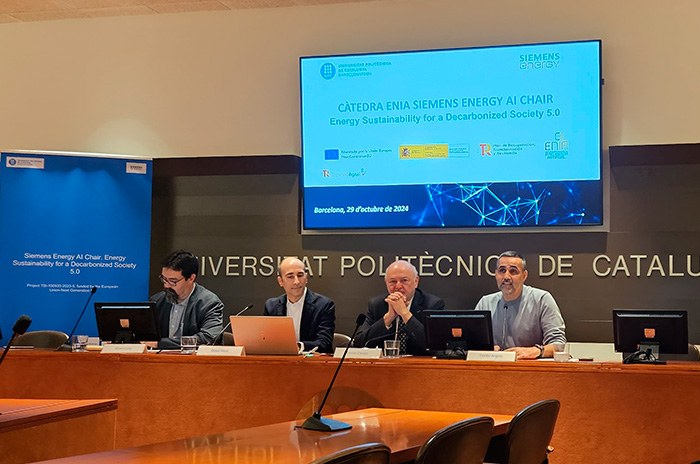New AI Chair in Energy Sustainability for a decarbonized society, with Siemens Energy
The UPC and Siemens Energy presented, on October 29, an artificial intelligence chair in energy sustainability to create solutions applicable to the business fabric and encourage cooperation towards a decarbonized society. This initiative is part of the ENIA chairs of the Spanish Government.

The new ENIA Siemens Energy AI Chair. Energy Sustainability for a Decarbonized Society 5.0 consolidates the collaboration maintained by the Universitat Politècnica de Catalunya - BarcelonaTech (UPC) and Siemens Energy to carry out innovation and research activities in the fields of data analysis and artificial intelligence.
The presentation ceremony took place at the Rectorate of the UPC and was attended by the rector of the University, Daniel Crespo; from the scientific director of the chair, Professor Cecilio Angulo; from professor Álvaro Luna, from the Department of Electrical Engineering, and the director of Siemens Energy's DigiHub Barcelona and Global Head Prescriptive Marketing, Oliver Pozo.
The main objective of the initiative is to promote research, development and innovation in artificial intelligence to provide solutions to the challenge of energy sustainability in industrial, agricultural and urban contexts. The chair will allow both entities to implement new lines of research to meet the needs of the business fabric, encourage cooperation in the different use cases defined, and promote the dissemination and implementation of artificial intelligence to advance the decarbonization of the society.
The approved initiative is part of the call for ENIA Chairs of the Ministry of Economic Affairs and Digital Transformation, within the National Strategy for Artificial Intelligence (ENIA), the España Digital 2026 agenda, as well as in the Recovery, Transformation Plan and Resilience.
"The decarbonisation of our economy and the fight against inequalities are, surely, the two great challenges of our society", stated the chancellor of the UPC, Daniel Crespo. "Doing relevant and impactful science in these areas is, for the UPC, a priority. We are aware of the relevance of our position and the impact we can achieve with a sound policy of knowledge transfer and innovation support. And we do all this with the collaboration of the actors of our productive and innovation ecosystems, and Siemens Energy is and will be a reference".
For Cecilio Angulo, scientific director of the chair, "the commitment of the Secretary of State for Digitization and Artificial Intelligence (SEDIA) of the Ministry for Digital Transformation and of the Public Service for the chair is a decisive boost to the continued public-private collaboration between agents who have in common challenges specific to society 5.0, such as decarbonisation and energy sustainability. AI as a disruptive element promotes synergies and innovative ecosystems at the UPC-Siemens Energy meeting point with an impact not only on research and innovation, but also on the real economy and people's reality."
Oliver Pozo, director of Siemens Energy's DigiHub Barcelona and Global Head Prescriptive Marketing, added that "in this world, where sustainability is a priority, it is essential that academia and industry join forces to face what we call the energy trilemma , that is to say, advance the sustainability of the energy we produce but also reduce its production cost and guarantee its availability. With this chair we will work to solve this trilemma."
AI to optimize performance and decarbonize power plants
The UPC and Siemens Energy have been collaborating since 2018 in the application of data analysis techniques and artificial intelligence in the energy sector. This collaboration has allowed progress in the research and proof of concept of intelligent models for the characterization of the operation of energy production systems, advanced data clustering methods of the different production modes, as well as advanced visualization algorithms of multivariable signals.
Current lines of research focus on optimizing the performance of energy plants based on artificial intelligence in different contexts: industrial, agricultural and urban. The objective is the development of technology to reduce emissions of polluting gases, introduce renewable energies, decentralize energy production and reduce dependence on fossil fuels.
The main researcher of the project is Professor Cecilio Angulo, from Intelligent Data Science and Artificial Intelligence (IDEAI-UPC). They are supported by UPC researchers Álvaro Luna, Antonio Camacho, Eduardo Prieto, Mónica Aragüés, Manel Velasco, Àngela Nebot, Maria Serra, Francisco José Múgica, Josep M. Guerrero, Guadalupe Gómez, Daniel Fernández and Jordi Cortés. The project is also supported by two international entities: the Center for Research on Microgrids (CROM) of the University of Aalborg, Denmark, and the Institute of Electricity Economics and Energy Innovation (IEE) of the Graz University of Technology, Austria.
Share: